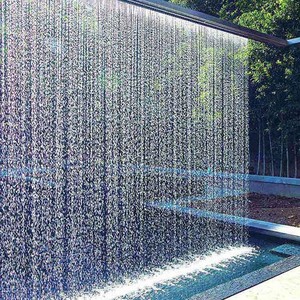(19902 products available)




























































































































































































Indoor outdoor fountains are divided into different types based on their placement, design, and functionality. Here are some common types:
Indoor Fountains
Indoor fountains are designed for use within homes or other indoor spaces. They are available in different sizes and designs to suit different spaces and preferences. Indoor fountains improve air quality by adding moisture to the air, which helps to decrease dust and static electricity. Additionally, the gentle sound of indoor fountains creates a serene atmosphere that promotes relaxation and can help minimize stress. More importantly, indoor fountains come with visual appeal as they act as a focal point hence improving a room's overall aesthetic.
Outdoor Fountains
Outdoor fountains are specifically intended for installation in outdoor areas, such as gardens, yards, or public spaces. They are designed to be more robust and resistant to weather elements like wind, rain, and extreme temperatures. Outdoor fountains offer a variety of aesthetic styles, from classic to contemporary, suiting various landscape designs. More importantly, they produce a more pronounced water sound that adds to the relaxing ambiance and improves the overall atmosphere.
Wall Fountains
These fountains are mounted on walls, making them space-efficient. Wall fountains are applicable in both outdoor and indoor settings. They utilize space that would otherwise be wasted and incorporate the stunning visual of flowing water into the area.
Tabletop Fountains
These are small fountains designed to be placed on tables, desks, or mantels. They add a touch of nature to any indoor space, promoting relaxation and tranquility due to their soothing sounds and gentle water flow.
Floor Fountains
These fountains are free-standing and placed on the floor. They are large and make a significant impact on the visual and auditory senses. Floor fountains are luxurious and dramatic additions to any indoor or outdoor space, creating a captivating focal point.
Solar-Powered Fountains
Solar-powered fountains are outdoor fountains that use solar panels to convert sunlight into energy for their operation. They are energy-efficient and eco-friendly since they do not require electricity. Additionally, they are easy to install because they rely on sunlight and do not require any wiring or access to an electrical outlet.
Waterfall Fountains
Waterfall fountains create the visual and auditory experience of a cascading waterfall. Waterfall fountains are visually striking and create a calming and energizing atmosphere with the sound of rushing water.
Religious Fountains
Some fountains are designed specifically for religious or spiritual purposes. These fountains can be found in places of worship, meditation centers, or prayer rooms.
When looking at the features and functions of indoor outdoor fountains for sale, it is important to note that they can differ based on size, style and materials used. However, broadly speaking, the features and functions will be as follows:
Functions:
Features:
Indoor outdoor fountains serve various purposes. They are used for aesthetic functions, relaxation, and energy conservation. The different uses are explained in detail below.
Indoor fountains are placed inside buildings, homes, offices, and hotels. They add beauty to spaces, making them look more elegant and classy. Indoor fountains also give a calm and serene vibe. They make the environment feel peaceful and tranquil. Indoor fountains also purify the air. They trap dirt and dust particles from the air, leaving it clean.
Outdoor fountains are placed in gardens, parks, and public spaces. They serve as focal points. They are the main centers of attraction in public spaces, making those areas more attractive. Outdoor fountains also produce sounds. They make soothing water sounds that are calming and relaxing.
Some fountains can be used for both outdoor and indoor purposes. These fountains are versatile. They can be placed inside or outside a home. They also elevate the aesthetic value of a space.
Some indoor outdoor water fountains have lights. These lights illuminate the fountain at night, making it more attractive. They also highlight the features of the fountain, making them stand out. Fountains with lights are also used as decorative pieces for parties and events.
Based on the research conducted by the National Association of Home Builders (NAHB), water fountains have numerous benefits. They are good for sleep. The soothing sounds of water help people sleep better. Having a fountain in the bedroom or close to the bedroom helps people sleep better.
Water fountains also reduce stress levels. They produce a tranquil vibe that reduces stress levels. People who work in office spaces that have water fountains feel less stressed. They also feel more relaxed. This is because the sounds of the water help to reduce anxiety and stress.
Another benefit of having a water fountain is increased focus and concentration. The sounds of the water help to increase a person's focus. This is because the sounds create a peaceful environment that is conducive to working. People working in office spaces with water fountains are more productive and focused.
Indoor water fountains are a popular home décor item and are available in various designs, sizes, and materials. When choosing the right indoor water fountain for a home, consider these factors:
Size and scale:
Measure the area where the fountain will be placed. Consider the room's dimensions, the fountain's height and width, and its depth. A small tabletop fountain may be sufficient for a small room, while a larger wall-mounted or freestanding fountain may be needed for a more spacious area. Ensure the fountain is not too large or small for the space. A fountain that is too large can overwhelm the room, while one that is too small may not have the desired visual impact. Finding the right size will help maintain a balanced and harmonious aesthetic in the room.
Style and design:
Indoor fountains come in various styles, such as modern, traditional, or Zen-inspired. Choose a design that complements the existing décor and overall ambiance of the space. Consider the materials used in the fountain. Common options include metal, glass, stone, or ceramic. Each material offers a distinct visual and textural effect, so select one that aligns with the room's feel.
Sound and lighting:
The soothing sound of flowing water is one of the main attractions of indoor fountains. Some produce a gentle trickle, while others have a more pronounced rush. Visit a showroom or listen to samples online to find the right balance for your preferences. Some indoor fountains have built-in ambient lighting that highlights the water flow and creates a calming atmosphere. If this is an important feature, consider it when choosing the fountain.
Maintenance:
Indoor fountains require regular maintenance to keep the water clean and the pump functioning properly. Consider the maintenance needs and choose a fountain that fits your lifestyle. Some fountains have self-circulating systems that minimize maintenance, while others may require more effort to keep clean.
Budget:
Indoor fountains are available at various price points. Determine your budget and find a fountain that fits within it without compromising quality. While it may be tempting to choose a less expensive option, remember that a well-made fountain will last longer and provide greater enjoyment.
Q1. Should a fountain be placed on grass or concrete?
A1. Fountains can be placed on either concrete or grass. However, the surface must be level to prevent the fountain from tipping over or falling apart. If the fountain is placed on grass, it should be moved occasionally to allow the grass underneath to grow.
Q2. What size fountain should be purchased?
A2. When purchasing a fountain, it should be of proportionate size to the space where it will be placed. Too large or too small a fountain for the available space will not be visually pleasing.
Q3. What maintenance is required for a fountain?
A3. Fountains should be cleaned regularly to prevent algae growth and mineral buildup, especially in outdoor fountains. The water should also be replenished and changed periodically.
Q4. What type of pump does a fountain need?
A4. A submersible pump is commonly used in garden fountains. It is placed inside the fountain basin and helps to circulate the water, creating the desired cascading or spraying effect.
Q5. Are fountains loud?
A5. The sound level of fountains varies. Some have a soft, gentle trickle that is barely audible, while others can produce a more noticeable splash. Factors like the water flow rate and height can affect the sound level.